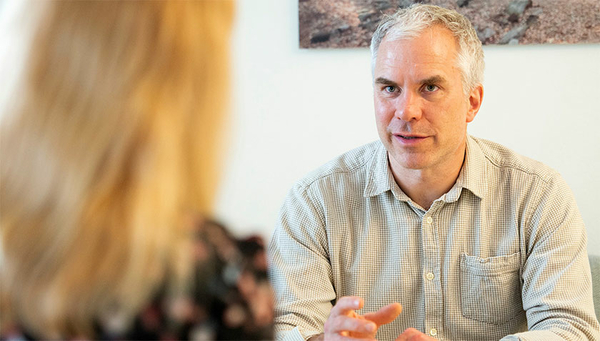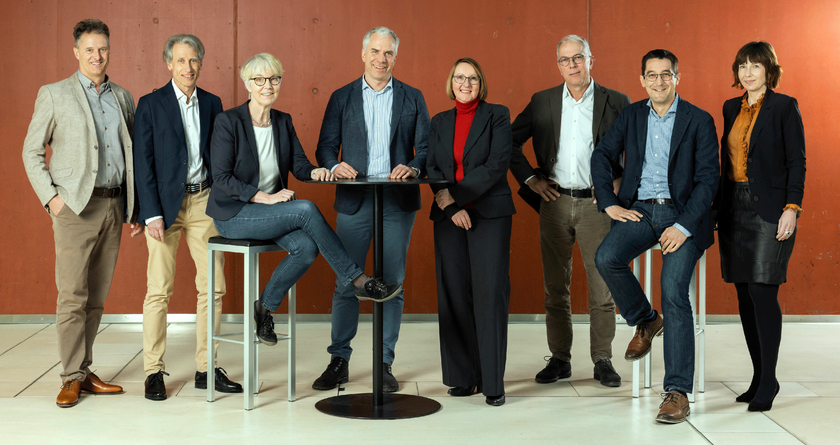Archive detail
“Eawag is also a solutions institute”
April 13, 2023 |
You have now been on the job as director of Eawag for 105 days. How do you assess the aquatic research institute after this time?
I have known Eawag from the perspective both as a researcher and as group and department head, so I have a good insight. What has newly impressed me, however, are the many research activities and projects, the significance of which I only now realise. For example, our research around the cities of the future or the growing heat and drought problem. But also our on-site projects in the Global South, where there are crucial questions about the future of water supply. I have learned a lot here.
I have been particularly impressed by the high level of commitment of all employees, who are working in their areas and beyond to find solutions to the great challenges of our time. The motivation and passion are tremendous.
When you first started, you said that Eawag’s employees had to be agile. What did you mean by this?
It’s about constantly questioning yourself as an institution and thinking about how you can have the greatest impact for the benefit of society with what you do. So it’s about asking yourself how people can best benefit from research and knowledge.
In short, being agile means asking yourself
whether one’s own work is in line with needs
and where and how the benefit is greatest.
This applies to all Eawag employees.
As a researcher, I know that interest and curiosity are the drivers for solutions and innovations as well as for new concepts and technologies. This means that there must always be room at Eawag for research that is not yet being discussed by society. This free scope is essential for the entire research process. Central to this is that we can bring together findings – the understanding of how things work – with the development of solutions to real problems.
That is why we are not a purely academically driven institute. We are a research and solutions institute.
And what is your role in this?
Every researcher is networked in their environment and knows about the relevant issues. My role is to identify the problems and challenges on a broader spectrum with my colleagues in the Directorate and to share this overview with the employees. I am a kind of intermediary who identifies the needs and, combined with the knowledge of Eawag employees, brings this into the scientific discussion. However, this also involves exploring the scope of what is possible and feasible and ultimately defining the overarching strategy.
You have also restructured the Eawag Directorate; what is the reason for this?
Yes, that’s right. Lenny Winkel and Florian Altermatt joined the Directorate in March. Christian Stamm is the new deputy director of Eawag.
At Eawag, the Directorate is a strategic body that is not integrated into line management. It is the idea of working in the service of the institute for a certain period of time and contributing one’s individual expertise. In order to be faster and more flexible, the members will now work in the Directorate on a rotational basis for a certain period of time. On the one hand, this allows the colleagues to continue working in their research areas and, on the other hand, it gives the board the flexibility to react to strategic developments. Again, the key word is agility, in the spirit of our mission.
In your opinion, what are the major challenges and how does Eawag intend to meet them?
Central topics are climate change, biodiversity loss, nutrient cycles and the introduction of new types of substances and organisms into our environment – topics that in turn are often linked through water. Water is at the centre and is involved in the interplay of complex and sometimes competing systems.
This makes our research elementary,
because it supports everything from the initial findings to their implementation
in Switzerland, in Europe and globally.
What is important here is a clear focus. For us, this is water. In order to capture the diversity and complexity of the research field, we need a broad research profile, diverse and interest-driven research and the clear objective of finding solutions. That is why at Eawag, researchers from the natural, engineering and social sciences closely together. Because science and technology often only provide the start of a solution to a problem – afterwards, it is political and social processes that anchor a solution in the long term. This is complemented by close partnerships with practitioners and an international network. In addition, academic training and vocational training play an important role at Eawag.
To what extent do the challenges also affect cooperation within the ETH Domain and with other institutions?
Let’s take the climate crisis, for example. It affects us on many different levels, as it not only changes our environment, but also how we operate, where and how we live, or whether we are healthy and remain so. In other words, the major problems are complex and overarching, and this requires a holistic approach. And we cannot solve these alone. It is therefore necessary to make even better use of existing synergies in the research area and to establish and expand new ones. In addition, there are close partnerships with practitioners as well as exchange and dialogue with authorities and politics.
And we are part of the ETH Domain
and together we have a tremendous innovative power.
The challenge now is to coordinate this effort efficiently and in a targeted manner and to make it usable without weakening the respective strengths. I am of the opinion that the ETH Domain, as Switzerland’s leading research area, has a responsibility here – and we can be expected to come up with solutions.
Recently, the Federal Council announced budget cuts that will affect the ETH Domain. What does that mean for Eawag?
The cuts would be very challenging for us. At Eawag, most of the budget is committed to infrastructure and personnel costs. The cuts would mean that our small, flexible budget would be halved. Besides Eawag’s national tasks, this would influence our work and research immensely.
What will happen at Eawag in the coming months?
Together with colleagues from all departments, we are currently evaluating where Eawag’s strategic priorities lie. We are holding discussions on whether and where we need to sharpen our profile and which ideas and visions we want to take up and pursue. Of course, we are not turning everything upside down and reinventing the whole of Eawag. But a change of leadership is a good opportunity to go over the books and hold on to what makes sense and open up new fields that have not yet been sufficiently considered.
Profile: Martin Ackermann
Martin Ackermann studied biology at the University of Basel, where he obtained his doctorate in 2002. He then worked for two years as a postdoctoral researcher at the University of California, San Diego. In 2004, he moved to the ETH Zurich as a senior assistant and became an SNSF assistant professor in March 2006 and was appointed associate professor by the ETH Board in 2008 and full professor in 2015. In addition to his professorship, Martin Ackermann headed the Environmental Microbiology research department at Eawag for ten years with around 50 employees, which is a leader in solution-oriented research in aquatic microbiology.
With his research group, Martin Ackermann works on fundamental questions about the ecology and evolution of bacteria. The objective is to expand the understanding of the biology of bacteria in nature and also to provide insights that have practical added value for the monitoring and use of bacterial activities.
Martin Ackermann has published over 100 scientific papers in international journals, many of them leading interdisciplinary journals. He is a member of the European Academy of Microbiology and is successfully involved in promoting young scientists. He was also Vice-President of the Swiss National COVID-19 Science Task Force from April 2020 and President from August 2020 to August 2021.
Martin Ackermann has been running Eawag since 1 January 2023 as director.
Cover picture: 105 days in office – Eawag Director Martin Ackermann is setting a new course, but is also well aware of the many strengths of the aquatic research institute.
(Photo: Eawag, Peter Penicka)


